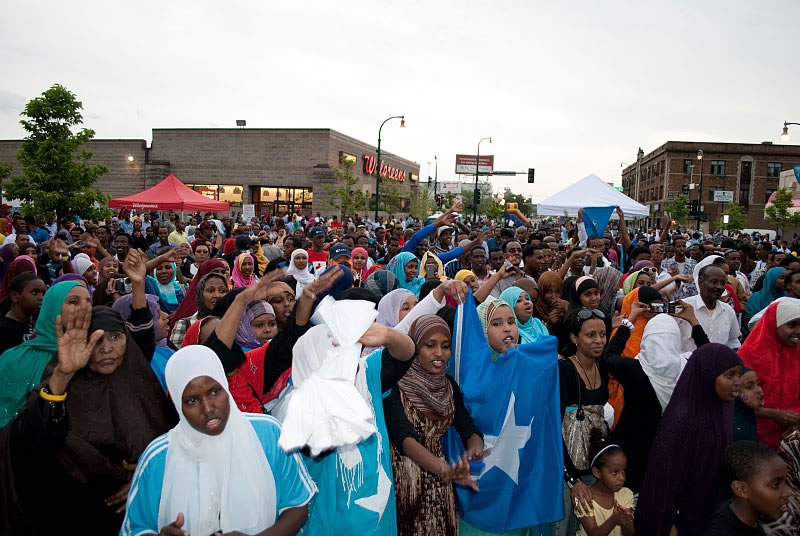IN THE SENATE OF THE UNITED STATES
Mr. FEINGOLD (for himself, Ms. KLOBUCHAR, and Mr. FRANKEN) submitted the following resolution; which was referred to the Committee on
RESOLUTION
Urging the development of a comprehensive strategy to ensure stability in Somalia, and for other purposes.
Whereas Somalia has been without a functioning central government since 1991, resulting in lawlessness and an increasingly desperate humanitarian situation;
Whereas, despite the return of the internationally recognized Transitional Federal Government (TFG) to Mogadishu and ongoing diplomatic efforts through the Djibouti Peace Process, supported by the United Nations, there has been little improvement in the governance or stability of southern and central Somalia, and armed opposition groups continue to exploit this situation;
Whereas the traditional mediation role played by Somali elders has been eroded as the dynamics of conflict and the proliferation of weapons make it difficult to influence warring parties;
Whereas, since 2007, armed violence has resulted in the deaths of at least 21,000 people in Somalia and the displacement of nearly 2,000,000 people, including over 500,000 refugees in Kenya, Yemen, Ethiopia, Eritrea, Djibouti, Tanzania, and Uganda;
Whereas the United Nations estimates that 3,200,000 people, or 43 percent of the population of Somalia, are in need of humanitarian assistance and livelihood support to survive;
Whereas the United Nations reports that almost 1,000,000 displaced Somalis in need of aid cannot be reached by United Nations refugee and food agencies because of growing insecurity and the threat of kidnappings to staff;
Whereas local humanitarian organizations are trying to meet the needs of the Somali people by restoring basic social services in urban and rural communities, which places them on the front lines of the conflict and make them vulnerable targets for killings, kidnappings, or being accused of working for foreign governments;
Whereas al Shabaab, which has been designated as a foreign terrorist organization by the Department of State, and other armed groups continue to wage war against the Transitional Federal Government in Mogadishu and one another to gain control over territory in Somalia;
Whereas al Shabaab has claimed responsibility for many bombings—including suicide attacks—in Mogadishu, as well as in central and northern Somalia, typically targeting officials of the Government of Somalia and perceived allies of the TFG; Whereas, according to Human Rights Watch, al Shabaab is subjecting inhabitants of areas under its control in southern Somalia to executions, cruel punishments, including amputations and floggings, and repressive social control;
Whereas the human rights situation in Somalia has dramatically worsened over the past several years with increased numbers of killings, torture, kidnappings, and rape;
Whereas the 2009 Department of State Country Terrorism Report notes that ‘‘Somalia’s fragile transitional Federal government, protracted state of violent instability, its long, unguarded coastline, porous borders, and proximity to the Arabian Peninsula, made the country an attractive location for international terrorists seeking a transit or launching point for operations in Somalia or elsewhere’’;
Whereas the situation in southern and central Somalia, particularly the activity of al Shabaab, poses direct threats to the stability of Puntland and Somaliland regions, as well as the stability of neighboring states and the wider region;
Whereas al Shabaab leaders have stated their intent to provide recruits and support for al Qaeda in the Arabian Peninsula in Yemen;
Whereas the Government of Eritrea has provided military and financial support for armed opposition groups, including al Shebaab, in part as a proxy front in its continuing tensions with Ethiopia;
Whereas, according to the most recent report by the United Nations Somalia Monitoring Group, arms, ammunitions, and military or dual-use equipment continue to enter Somalia at a fairly steady rate, primarily from Yemen and Ethiopia;
Whereas, in July 2009, the Department of State confirmed that, in addition to other support for the TFG, it had provided cash to purchase weapons and ammunitions for the TFG’s efforts ‘‘to repel the onslaught of extremist forces which are intent on destroying the Djibouti peace process’’;
Whereas, according to most recent report by the United Nations Somalia Monitoring Group, ‘‘[d]espite infusions of foreign training and assistance, government security forces remain ineffective, disorganized and corrupt — a composite of independent militias loyal to senior government officials and military officers who profit from the business of war and resist their integration under a single command’’;
Whereas, on April 24, 2010, President Barack Obama issued an executive order to sanction or freeze the assets of militants who threaten, both directly and indirectly, the stability of Somalia, as well as individuals involved in piracy off Somalia’s coast;
Whereas, in March 2009, at a hearing of the Committee on Homeland Security and Government Affairs of the Senate, Andrew Liepman, Deputy Director of Intelligence at the National Counterterrorism Center, noted that ‘‘[s]ince 2006, a number of U.S. citizens [have] traveled to Somalia, possibly to train in extremist training camps’’;
Whereas, in September 2009, at a hearing of the Committee on Homeland Security and Government Affairs of the Senate, the Director of the National Counterterrorism Center Michael Leiter testified that ‘‘the potential for al-Qaeda operatives in Somalia to commission Americans to return to the United States and launch attacks against the Homeland remains of significant concern’’; and Whereas the extraordinary and ongoing crisis in Somalia has enormous humanitarian consequences and direct national security implications for the United States and our allies in the region: Now therefore be it Resolved, That the Senate—
(1) acknowledges the urgency of addressing the
threats to United States national security in Somalia
and the conditions that foster those threats;
(2) reaffirms its commitment to stand with all
the people of Somalia who aspire to a future free of
terrorism and violence through advancing political
reconciliation and building legitimate and inclusive
governance institutions;
(3) recognizes the difficult, but very important,
work being done by the African Union Mission in
Somalia (AMISOM) to help secure parts of
Mogadishu, and reaffirms its support for the mis14 sion;
(4) calls on the Transitional Federal Govern16 ment in Somalia—
(A) to cease immediately any use of child
soldiers;
(B) to ensure better accountability and
transparency for all received security assistance;
(C) to renew its commitment to political reconciliation; and (D) to take necessary steps toward becoming a more legitimate and inclusive government in the eyes of the people of Somalia;
(5) calls on all actors and governments in the region, particularly the Government of Eritrea, to play a productive role in helping to bring about peace and stability to Somalia, including ceasing to provide any financial or material support to armed opposition groups in Somalia;
(6) welcomes efforts by the President to bring greater focus and resources toward understanding and monitoring the situation in Somalia;
(7) urges the President to develop a comprehensive strategy to ensure that all United States humanitarian, diplomatic, political, and counterterrorism programs in Somalia and the wider Horn of Africa are coordinated and making progress toward the long-term goal of establishing stability, respect for human rights, and functional, inclusive governance in Somalia;
(8) urges the President and Secretary of State, as part of a comprehensive strategy— (A) to provide greater support for a range of diplomatic initiatives to engage clan leaders, business leaders, and civil society leaders in Somalia and the Somali Diaspora in political reconciliation and consensus-building; (B) to ensure better oversight, monitoring, and transparency of all United States security assistance provided to the TFG; (C) to increase and strengthen the United States diplomatic team working on Somalia, including the appointment of a senior envoy, and to ensure that these officials have the necessary resources, access, and mandate; (D) to pursue opportunities for periodic, temporary United States Government travel to Somalia, consistent with any security concerns; (E) to expand and deepen our engagement with the regions of Somaliland and Puntland and other regional administrations in order to promote good governance, effective law enforcement, respect for human rights, and stability in these regions; (F) to explore, in consultation with the Secretary of the Treasury, increased options for pressuring individuals, governments, and other actors who undertake economic activities that support armed opposition groups and violence in Somalia; and
(G) to develop, in consultation with the Administrator of the United States Agency for International Development, creative and flexible mechanisms for delivering basic humanitarian assistance to the people of Somalia while minimizing the risk of significant diversion to armed opposition groups.






























![[6.jpg]](https://blogger.googleusercontent.com/img/b/R29vZ2xl/AVvXsEg5gi_Oq2Enszx5V7daK9w6qkCWDKJkwZpyX_gAK-pIQfsujIcOYkC2qaRuWjl9qGsEO8Z5tnRTrPljwtBA7xGu1J8BfzsA_vvPDSldJDCy7CyILf7ADihjQIQo51wct6r-ZJ5HNLzLVRU/s1600/6.jpg)



